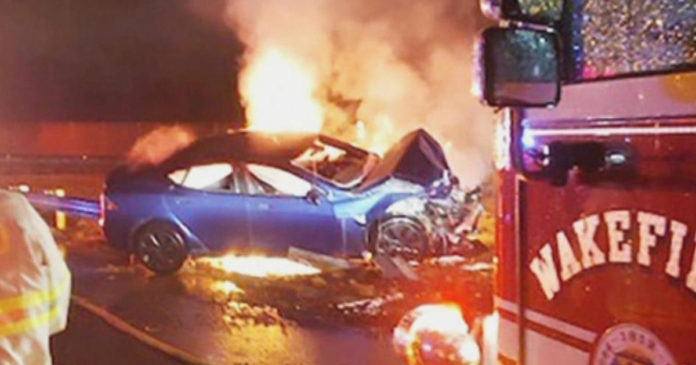WAKEFIELD – When a man hit a patch of black ice on I-95 late Thursday night and lost control of his car, it wasn’t the actual impact with the guardrail that caused the major damage. The man was OK and got himself out of the car. When he left the scene and went home is when the Tesla burst into flames.
“When they were trying to remove the vehicle, the guardrail it was hung up on punctured the battery pack,” Wakefield Fire Chief Tom Purcell explained. That puncture made the car burst into flames.
Wakefield Fire Department
When a standard, gas-powered car erupts in flames, firefighters quickly work to get as much water on it as possible. “We are going to knock that down with half a tank of water or a full tank in most cases,” Purcell explained.
But the world of electric vehicle fires is unfamiliar territory. The lithium-ion batteries under the car pose a major hazard when the car is on fire. “If those battery packs go into thermal runaway, which is just a chemical reaction, then they get super-heated and they run away. You can’t put them out. They don’t go out. They reignite. And they release tremendously toxic gases,” he said.
Flames can reach up to 2500 degrees, Purcell explained. And no matter how much water you put on the car; the batteries will reignite.
This particular fire took firefighters hours and required more than 20,000 gallons of water to be put out.
CBS Boston
The situation presented a unique challenge for the crews, with no exact science behind how to extinguish an electric vehicle fire. For example, some departments will use water until the fire is out. Others will let it burn itself out.
As firefighters and first responders nationwide are learning about electric vehicle fires as the cars become more and more popular, they’re seeking advice from other jurisdictions. Chief Purcell said his phone was ringing off the hook in the day that followed the fire. “When they hear about this, they want information which is why we’ve already received a number of phone calls, you know, ‘what did you do? What happened? What did you see? Do you have video?'” he explained.
Chief Purcell said each EV fire is a lesson for the next. “You have to read a lot of literature,” he explained. “You have to go to school. You have to educate yourself. But you have to get the correct information and it’s just not all out there yet. It’s just starting to come around.”




